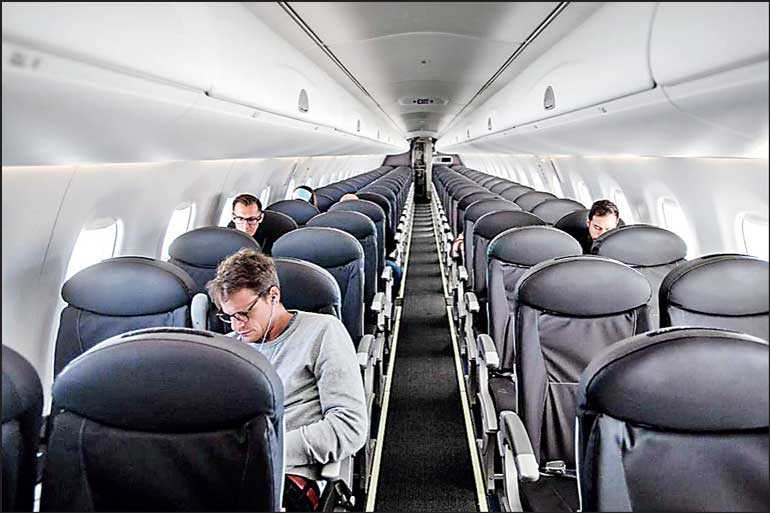Thursday Feb 12, 2026
Thursday Feb 12, 2026
Monday, 16 March 2020 00:00 - - {{hitsCtrl.values.hits}}

When Donald Rumsfeld was Defence Secretary of the USA he made famous the phrase incorporating this article’s two-word title, at a press conference in February 2002. That was just prior to the US-led invasion of Iraq, and he said it in response to a question about the lack of evidence linking Iraq to the 9/11 attacks. 
Today the world is facing an ‘Unknown Unknown’ of epic proportions. The World Health Organization (WHO) has labelled COVID-19 a pandemic, and the possible consequences to the travel industry are incalculable.
Travel bans
China, the epicentre of COVID-19, was able to impose draconian travel bans and isolate an entire province with a population in excess of 58 million. That seems to have slowed the spread of the virus somewhat, but nevertheless enough carriers have travelled, spreading it all over the world.
Italy, with a population of 60 million, has essentially followed suit. All public places including restaurants and museums have been closed, with only pharmacies and grocery shops permitted to remain open.
The USA has more recently imposed a travel ban on passengers from most European countries with the exception of the UK. Israel was one of the first countries to impose a blanket ban – restricting entry of foreign nationals and requiring residents who return to self-isolate for 14 days. It is more than likely that Australia and New Zealand will also segregate themselves, as public opinion and scientific evidence trends in that direction.
Can we use the past as a guide?
Unfortunately, in this case history does not appear to be a reliable guide. The SARS epidemic of 2002-03 led to sharp downturn in Asian travel, but it recovered quite quickly – a classic ‘V shaped’ demand curve. SARS infected around 8,000 people and led to less than 1,400 deaths.
This time though, all sources say the drop off was ‘like falling off a cliff’ – sudden and dramatic in its intensity. It is possible that the final demand curve will be ‘U shaped’ with the precipitous drop followed by a prolonged hiatus, before recovering steadily. But this remains to be seen – another ‘Unknown Unknown’. Since COVID-19 has already infected over 135,000 people and led to more than 4,900 deaths the recovery is probably going to be very slow.
How far will the virus spread?
Again, this is unknown at the time of writing. Germany’s Chancellor Angela Merkel, the most honest and forthright of the current world leaders, has stated that scientific evidence indicated up to two-thirds of that country’s population would become infected. Merkel has a PhD in Physics from Leipzig University and, unlike certain other world leaders, has a firm grasp of the science behind this pandemic.
Germany has a population of 82 million. Assuming the Chancellor’s estimate is correct, 13.7 million will contract the virus. Even a 1% mortality rate would lead to over 135,000 additional deaths in Germany alone – a staggering number.
The mortality rate would depend heavily on the number of ‘acute-care’ beds available in hospitals. Germany has just over one ICU bed per million residents (source: statista.com) – a much higher number than many other countries. Fewer acute-care beds could lead to much higher mortality rate – another Unknown.
Will the heat save tropical countries?
Yet another Unknown. It appears that in temperatures above 27°C (80°F) the virus is inhibited. It seems possible, therefore, that the spread of COVID-19 will be limited in the tropical world.
A pandemic of this nature last occurred in 1918: the infamous Spanish Flu. This virus first appeared in March of that year and it returned in a mutated form in November, just as the First World War ended. Spread by troops returning home, the virus killed around 50 million people – a number so large that makes it hard to imagine.
Ceylon (Sri Lanka), recorded 41,916 deaths from the influenza epidemic in the years 1918 and 1919, according to the Registrar General.
The tropical heat did not save Ceylon at that time.
How will COVID-19 affect the airline industry and travel trade?
This is the biggest ‘Unknown’ of them all.
The cruise ship industry, a near-perfect incubator of the virus, is already in tatters. Two of the world’s largest cruise lines have pleaded for help from their governments and more will follow.
The hotel and resort sector will be very badly affected by the travel bans and restrictions on large gatherings. The Formula 1 season is already compromised with The Melbourne GP being cancelled. Landmark events such as the Tokyo Olympics, The Hajj and Expo 2020 Dubai, which are due later in the year, also face cancellation. This would have a huge knock-on effect on the entire world economy. There is no doubt that every airline in the world will be severely affected. Large, profitable carriers with substantial domestic networks and significant cash reserves will probably be able to weather this storm. Consolidations on a massive scale will occur as the crisis abates. The problems of irrational overcapacity will finally be addressed as a result of a virus, rather than judicious business decisions.
But for many of the world’s ‘legacy carriers’, most of which are notoriously unprofitable, this could well be a deathblow. Already several well-known brands are on the verge of bankruptcy and, like the cruise ship sector, are clamouring for government assistance.
But with the scale and length of the travel downturn ‘Unknown’, financial assistance may turn out to be a bottomless pit that most countries cannot afford, especially at a time when the nation’s resources are desperately needed by the health sector to control the pandemic.